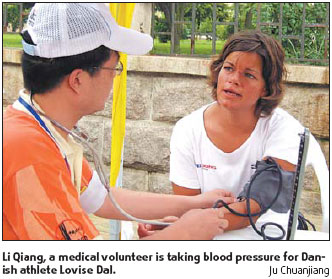Safety first for international fleet

QINGDAO: Whether you're visiting, working or competing at the Qingdao Olympic Sailing Center, the minute you walk into the "five-star" harbor you enter a safety zone.
Medicines for seasickness and heatstroke, sunscreen, free hats, live warnings of hazardous weather, life jackets, lifeguards, ambulances and emergency yachts equipped with first-aid equipments - all are provided at the Sailing Center.
"We have done several drills for every single part of our medical services and made full preparation for even the most impossible scenarios, like a sudden death," medical service team head Sheng Xueqi told China Daily.
"If someone gets a serious multiple fracture offshore, we'll use a special air-bag to fasten his body tightly to the yacht to send him back to shore.
"With this kind of very expansive air-bag equipment, he won't feel a thing on the bumpy drive."
Sheng said it cost 1.2 million yuan ($160,000) to upgrade first aid equipment aboard yachts and in ambulances.
Sheng and 54 other doctors and nurses from Qingdao's best hospitals have been chosen to watch out for athletes, spectators, volunteers and other officials at the Olympic Sailing Center during the 15-day Olympic sailing test event.
Their complimentary and bilingual services are available at six separate medical treatment stations, three offshore and three on terra firma.
Sheng also admitted that medical treatment for international athletes is a bit trickier, not because of language barriers but because doctors must be very careful when prescribing drugs.
"Most of the drugs we use on ordinary patients could not be used on the athletes, because they have the chemical elements that can be used as stimulants," Sheng said.
"So before we prescribe, we have to double-check the long list of restricted drugs that WADA (World Anti-Doping Agency) gives us."
In the unlikely event an athlete is seriously injured, the city's best hospital is a quick two-minute drive from the sailing centre.
The Qingdao Municipal Hospital boasts international clinics with half of its doctors hailing from other countries and regions.
The hospital also has a teleconference system that will allow international athletes to receive diagnoses from their own country's Olympic medicos, who may stay with the bulk of their team in Beijing during the Games.
(China Daily 08/14/2007 page24)














